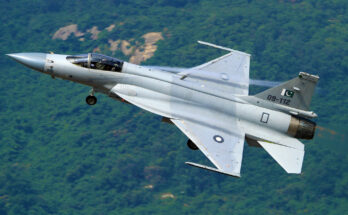Pentagon officials are pushing Congress to tweak the annual defense policy bill on the current legislative docket in order to open up a path for cooperation on collaborative defense programs with the European Union. The amended language will include naming the EU and its administrative bodies – such as the European Defense Agency (EDA) – in the Arms Control Act, thereby enabling conventional defense work with the 27-member bloc to move forward. Such work will cover joint research, development, test and evaluation of potential procurement of articles or services.
The goal is to enable the U.S. to be able to participate in the EU’s nascent weapons development and other initiatives, while defining key rules regarding future cooperative projects – including participation, information-sharing, and intellectual property use.
As a non-member of the bloc, Washington has little influence when the EU undertakes capability projects under its exclusive defense cooperation mechanism, PESCO (Permanent Structured Cooperation). This exclusivity is, of course, the rationale behind PESCO: providing the EU with its own channel for intensifying European defense cohesion and, by extension, cultivating a degree of autonomy in national security while strengthening the collective European defense industrial landscape.
The latter aspect, in particular, has fueled concern in Europe over opening up the limited pool of EU funding for PESCO projects – currently around EUR7.9 billion ($8.34 billion) through 2027 – to the U.S. defense sector.
With American defense companies used to feeding from a far larger trough ($700+ billion in topline U.S. defense spending, with roughly $100+ billion of that earmarked for defense research and technology investments), the concern from the European perspective is that the local vendors will be competing on an uneven level, with the likely result being European taxpayer money siphoned into the hands of U.S. contractors.
The possibility of opening up PESCO projects to U.S. defense primes naturally raises concern in certain quarters of Europe, particularly where different end-goals for EU defense cooperation persist.
The basis of PESCO is to serve as a vehicle through which Europe builds greater military integration capable of serving as a binary defense component of NATO, while acting in accordance with EU foreign policy aims and military operations under its Common Security and Defense Policy (CSDP). All of this is to be done through synchronization of capability requirements and goals, and harmonization of investment in research and technology and procurement.
The ideal end result as seen from one end of the EU spectrum (namely France) is greater Europeanization of capabilities and supply chain cultivation, and thus greater European strategic autonomy.
This vision does not involve locking in European dependence upon U.S.-based technological solutions to meet military needs – quite the opposite.
P – PESCO | The Permanent Structured Cooperation framework aims to deepen #defencecooperation between 25 🇪🇺Member States
In November 2021 the @EUCouncil adopted a new wave of PESCO projects addressing gaps in #defencecapabilities
There are now 60 #PESCO projects underway pic.twitter.com/W1Ng57szgv
— European Defence Agency (@EUDefenceAgency) May 9, 2022
Already there are 60 standing PESCO projects, with a Military Mobility project the lone instance of non-EU members (in this case the U.S., Canada and Norway) being invited to join. But this project – aimed at moving troops and equipment rapidly across Europe – converges with NATO requirements, as 21 European nations are members of both blocs.
Exceptions for non-EU invites for PESCO projects such as the Military Mobility project – handled on a case-by-case basis – are one thing, but to open the door fully would potentially jeopardize any grander aspirations for EU strategic autonomy. Hence sensitivities involving politics and industrial protectionism continue to serve as obstacles to greater trans-Atlantic defense cooperation.
Yet one of the original rationales behind proponents’ push for deeper European defense cooperation – the idea that Europe could not always rely on the U.S. or NATO to provide for its security – has been turned upside down in the near term by the war in Ukraine and Washington’s response.
Two more EU-only members – Finland and Sweden – appear poised to apply for NATO membership in the coming months, which, if undertaken, would drive the number of dual EU-NATO members up to 23.
The reality is that the security landscape has changed since 2017, when multiple mechanisms aimed at spearheading greater European defense integration were first launched, and much more since January 2021 when the Biden administration came into office.
No doubt some European leaders worry that a resolution to the Russia-Ukraine conflict or a return of a more isolationist-minded, transactional U.S. administration such as former President Donald Trump’s may once again prompt Washington’s gaze to drift elsewhere.
But at least for now, some momentum between the U.S. and its EU allies on the defense cooperation front appears to be building.
Dan Darling is Forecast International’s director of military and defense markets. In this role, Dan oversees a team of analysts tasked with covering everything from budgeting to weapons systems to defense electronics and military aerospace. Additionally, for over 17 years Dan has, at various times, authored the International Military Markets reports for Europe, Eurasia, the Middle East and the Asia-Pacific region.
Dan's work has been cited in Defense News, Real Clear Defense, Asian Military Review, Al Jazeera, and Financial Express, among others, and he has also contributed commentary to The Diplomat, The National Interest and World Politics Review. He has been quoted in Arabian Business, the Financial Times, Flight International, The New York Times, Bloomberg and National Defense Magazine.
In addition, Dan has made guest appearances on the online radio show Midrats and on The Media Line, as well as The Red Line Podcast, plus media appearances on France 24 and World Is One News (WION).




